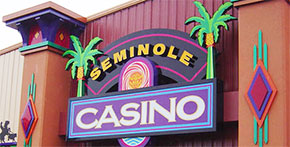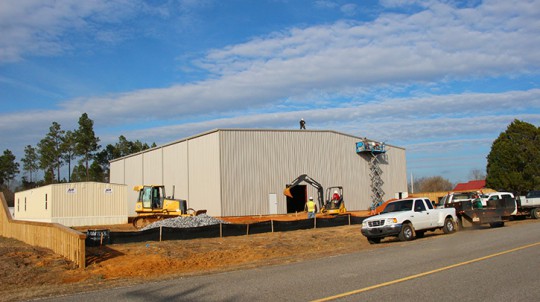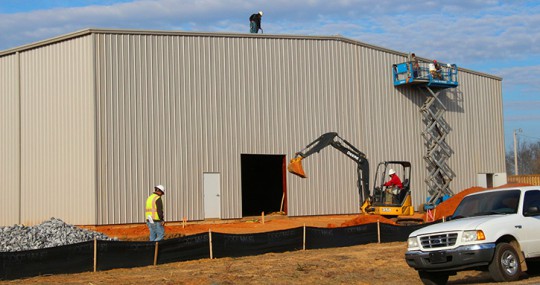Florida Senate Considers Gambling Deal With Seminoles, Leaving Out Poarch Creeks
April 6, 2015
The Florida Senate has showed its hand with a gambling proposal that would extend for another year a deal that gives the Seminole Tribe exclusive rights to banked card games such as blackjack at most of its casinos — and leaving out the Poarch Creek Indians of Atmore.
The Poarch Band of Creek Indians really want a small North Escambia parcel in the Nokomis community to be the home of their next gaming facility. A large metal building has been constructed that covers a majority of the acre, about five miles west of Highway 97 on Nokomis Road. They are officially calling the structure a “warehouse”, but its true future use remains to be seen.
About a year ago the tribe asked Gov. Rick Scott for Tribal-State gaming compact that would allow the tribe to operate casino-like gambling on the property. Such an agreement would allow the tribe “to conduct any Class III gaming activity which is played or may be played in the State of Florida, including, but not limited to, banked card games,” then-Tribal Chairman Buford Rolin wrote in a letter to Scott. Class III gaming in Florida includes table games and slot machines. They have also made it clear that they would like banked card games at other sites like Pensacola, Gretna and Tallahassee.
Scott has refused to negotiate a compact, saying more recognition is needed first from the federal government. Scott has also not been involved in talks with the Seminoles; he’s letting the Legislature play Florida’s hand in the high stakes gambling game.
Seminole Agreement In Balance
Senate Regulated Industries Chairman Rob Bradley, who released the proposal that would give exclusive rights to the Seminoles. said he plans this week to take up the extension of the agreement — which will expire July 31 unless the Legislature acts.
 The Senate plan is a stark contrast to a sweeping gambling proposal floated by House Majority Leader Dana Young, R-Tampa. Young’s proposal would essentially do away with a broader 20-year agreement with the Seminoles, called a compact, by authorizing two Las Vegas-style casinos in Broward or Miami-Dade counties and allowing pari-mutuels in Lee and Palm Beach counties to add slot machines.
The Senate plan is a stark contrast to a sweeping gambling proposal floated by House Majority Leader Dana Young, R-Tampa. Young’s proposal would essentially do away with a broader 20-year agreement with the Seminoles, called a compact, by authorizing two Las Vegas-style casinos in Broward or Miami-Dade counties and allowing pari-mutuels in Lee and Palm Beach counties to add slot machines.
“It’s kind of unexpected, given that I know we both have been having conversations with the tribe,” Young said Friday of Bradley’s plan.
Talks between the Legislature and the Seminole tribe — which has expressed interest in obtaining the ability to offer craps and roulette — only began in earnest within the past few weeks, Bradley said.
“This decision is a reflection of a distance between where the parties want to be and would allow us to close that gap in a short period of time,” Bradley, R-Fleming Island, said. “I think this is the prudent thing to do for the people of Florida at this point in time. It allows us to continue with the status quo until we get a deal that makes sense for the state of Florida and makes sense for the tribe.
Bradley’s plan came four weeks before the legislative session is scheduled to end May 1. And, with the House and Senate deadlocked over a $5 billion health-care budget disagreement, the gambling-deal extension could provide lawmakers a far easier — and more palatable — option than Young’s massive overhaul.
After a House committee held a workshop on her proposal last week, Young said she was uncertain whether the traditionally gambling-leery House would even give her measure (HB 1233) a vote.
But on Friday, Young said she hoped her bill would be taken up by the House Regulatory Affairs Committee next week, creating another possible showdown between the two chambers over the competing gambling plans.
“This was an unexpected change of events. But I am certainly willing to keep an open mind and look forward to talking with Sen. Bradley and his Senate colleagues on why they believe this is in the best interest of Florida,” she said.
Under the current agreement, the Seminoles agreed to pay the state a minimum of $1 billion over five years in exchange for exclusive rights to banked card games at five of its seven facilities throughout the state. The tribe’s payments to the state, which also take into account revenue from games such as slot machines, have thus far exceeded the minimum and are expected to increase under a complicated revenue-sharing formula inked in 2010.
While the House and Senate remain at odds over Young’s approach, Bradley’s plan will “make sure the issue is not left on the cutting room floor,” said Senate Majority Leader Bill Galvano, who played a major role in crafting the 2010 agreement with the tribe.
Gov. Rick Scott attempted to strike a deal with the tribe last year, but the talks blew up in the final days of the legislative session. This year, Scott has left negotiations up to lawmakers, who must authorize any agreement between the state and the tribe.
Unlike Scott’s failed plan that would have allowed the tribe to expand the types of games they offer, Bradley’s measure (SPB 7088) would simply extend the banked card games portion of the deal for another year. Because next year’s session begins earlier than usual, in January instead of March, the Legislature would be able to quickly address the issue without letting the state’s share of money from the card games — at least $116 million a year — evaporate.
The Seminoles, who have launched a major publicity campaign — including four statewide television ads — to urge the Legislature to re-up the banked card games, are aware of Bradley’s proposal but did not play a role in the Senate’s choice to consider a one-year extension, tribe spokesman Gary Bitner said.
“The tribe is just learning of the plan and is considering it,” Bitner said.
Extending the five-year agreement for another year also would avoid potentially costly and drawn-out litigation with the tribe, whose lawyers have raised questions about whether the Seminoles would have to discontinue the card games after July 31 if no deal is reached.
“The measure is a reminder to the tribe that their ability to maintain banked card games at their facilities exists at the pleasure of the Legislature,” Galvano, R-Bradenton, said.
Dara Kam, the News Service of Florida contributed to this report.
Pictured above and below: A “warehouse” under construction on an acre of land owned by the Poarch Creek Indians in the North Escambia community of Nokomis. NorthEscambia.com photos, click to enlarge.

Comments
13 Responses to “Florida Senate Considers Gambling Deal With Seminoles, Leaving Out Poarch Creeks”




From an article posted here on in Feb. 2015:
“The one acre in Nokomis has been held in trust since 1984 by the United States government for the Poarch Creek Indians. That, the tribe contends, meets the definition of “Indian lands” .
How do you think they were able to construct that huge “warehouse” on what is zoned VR-1?
Jeeperman, “And there are no zoning rules on Indian nation lands” No where does this article say that this is Indian Nation Land. It is referred to as Indian owned land. It may or may not be subject to regulations and zoning set up by states and local governments. If it is land within the reservation then you are correct, if not then the land could be Fee Land or restricted Fee Land in the case of the latter it would fall under the state and local control for zoning.
1.) Native Americans are more than a “race” @Harvey Stacey. We, politically, have a different status from others as our nations were here long before the good ole US of A. This is our land, our nation.
2.) @Greg Karan, yes lets screw over the Indians again for profit. Gaming was given to tribes as a way of being financially stable. Now that they have been successful everyone else is jealous and wants in on it too. Smh you know very well opening up gambling to non-tribal entities would be detrimental to the tribes.
3.) The Porch Creeks are not in Florida, they are in Alabama. Why should FL give in to them?
I played at the Indian Casino east of Fort Meyer and they had all the table games you can find in Vegas. It makes no sense not to pass a general gaming statute which allows 10 new licenses for the State of Florida. The tourists dollars are driving over to Biloxi to spend money on restaurants and casinos. Keep the money in Pensacola area, and quit the politics of special interests. Gambling is here. The Dog track has worked perfectly as people enjoy poker. It looks like a retirement home with all the seniors out smarting the whippersnappers…..wake up it is already here.
Politics politics politics. Why does this state have to be such control freaks?
At some point the Poarch Creek Indians can bypass the state and negotiate directly with the feds.
And there are no zoning rules on Indian nation lands.
Greg, no where in this article does it mention horse racing or dog tracks. this article is about opening a casino in a metal building on an acre of land in a rural community that is not zoned for such. If I lived in this community I would not want the traffic this would bring. and I am sure it would probably be a 24 hour operation. If not 24/7 it most likely will be open until the wee hours of the morning, creating extra traffic and noise in a quiet peaceful community. This type of business is just totally wrong for the demographics of this area.
Re:BT. Pick a special group? Really. Let the whites or blacks or Mexicans try to open a casino ,,I am sick and tired of this give it all to one group ,,Does Alabama and Florida hate all but the Indians ?I do not go to casinos but I see all the tax dollars both states are loosing out of ignorance
Seminole tribe have and always will be a part of Florida. Porch can’t have it all.
I can see where the Poarch Creek Indians might be upset. It is just not right that the state would pick a special group to reap the benefits, while excluding everyone else. It just doesn’t seem fair…
There are far better ways for our state to make money and have a viable business that will bring much needed jobs to our state than gaming. I also guess all the Poach commercials are a media campaign to garner support for the gaming….Sad.
@ Greg
You’ve pretty much hit the nail on the head there.
It is literally all about the perception of Politics and who ends up looking the best while not always doing the best things for the people.
The State of Florida continues to leave hundreds of millions of dollars on the table.
All of the studies thus far have stated all other pari-mutuels will contribute a lot more than the Seminole Tribe currently contributes. Let’s not forget the total economic impact that will be generated by allowing two new integrated resort destination casinos. Taxes, much needed employment to help our economy.
Where are the latest studies that were requested by the State of Florida?
Too much time wasted and our Governor is not working for the benefit of Florida taxpayers.